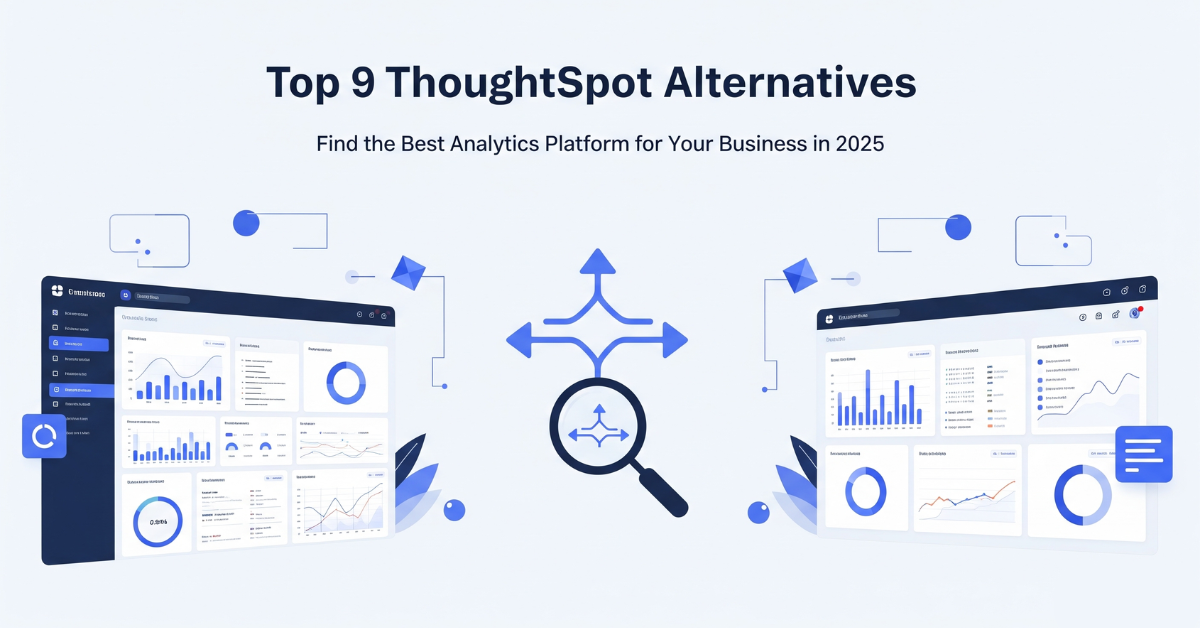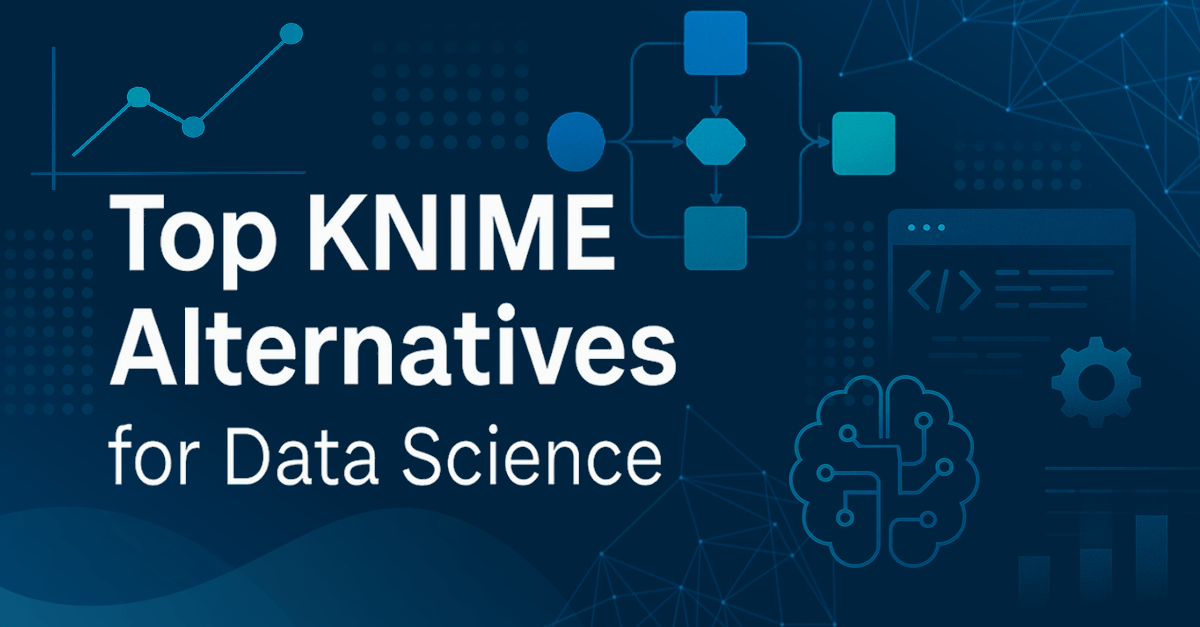Top Trifacta Alternatives for Data Wrangling in 2025
Looking for alternatives to Trifacta for data wrangling?
This article covers the top 10 Trifacta alternatives in 2025, with unique features and use cases to help you find the right tool.
Overview of Trifacta Platform
Trifacta, now part of Alteryx as Designer Cloud, is a data wrangling platform that focuses on transforming raw data into clean, structured formats suitable for analysis. It offers an intuitive, browser-based interface with machine learning-assisted suggestions to guide users through the data preparation process. The platform supports collaboration among data engineers and analysts, facilitating the creation of data pipelines and ensuring data quality and governance.
The 10 Best Trifacta Alternatives & Competitors
Data wrangling tools can be overwhelming, but we’ve got you covered. Here are the top alternatives to Trifacta, each exceling in a specific area:
-
Best for Manufacturing Data Integration: Factory Thread
-
Best for Cloud-Native Data Transformations: Matillion
-
Best for Comprehensive Data Management: Talend
-
Best for Advanced Analytics: Alteryx
-
Best for Budget-Friendly Data Preparation: Power Query
-
Best for Real-Time Data Replication: Hevo
-
Best for Automated Data Flows: NiFi
-
Best Open-Source Solution: Airbyte
-
Best for Code-Driven Development: Meltano
-
Best for Collaborative Data Science: Dataiku
These tools are chosen for their unique strengths, for needs such as seamless data integration, advanced analytics and real-time data replication.
Here’s a closer look at what makes each of these alternatives stand out.
Factory Thread - Best for Manufacturing Data Integration
Factory Thread is a data virtualization platform purpose-built for manufacturing. It connects systems like MES, ERP, CRM, and quality management tools into a unified data layer that enables real-time access, centralized governance, and efficient workflow orchestration. It reduces downtime and boosts data accuracy, all while empowering non-technical users with intuitive visual design tools.
Why Factory Thread is the Top Trifacta Alternative in 2025
While Trifacta is a versatile platform for general-purpose data wrangling, it lacks the manufacturing-specific connectors and real-time operational intelligence that Factory Thread provides. Factory Thread stands out by offering pre-built integrations for legacy systems, AI-assisted workflow generation, and drag-and-drop tooling—streamlining complex manufacturing data transformations that Trifacta does not natively support.
What Factory Thread is Ideal For
Factory Thread is best suited for manufacturing teams that need to:
-
Connect and unify data from ERP, MES, CRM, and shop floor systems
-
Monitor operations in real-time to detect anomalies and bottlenecks
-
Quickly build workflows using a low-code visual interface
-
Enable non-technical users to access and analyze operational data
-
Avoid data duplication through intelligent virtualization
Factory Thread vs Trifacta: 2025 Comparison
|
Feature / Aspect |
Factory Thread |
Trifacta |
|---|---|---|
|
Primary Use Case |
General-purpose data wrangling |
|
|
Industry Focus |
Manufacturing-specific |
Industry-agnostic |
|
Deployment Options |
Cloud, on-premises, edge (supports offline runtime) |
Cloud-first |
|
Workflow Design |
Low-code visual designer with AI workflow prompts |
Visual and code-based transformation interface |
|
MES, ERP, CRM, IoT connectors; real-time access |
Cloud and flat file sources; batch processing |
|
|
Real-Time Monitoring |
Yes – built-in dashboards and alerts |
No native real-time monitoring |
|
AI Features |
AI-generated workflows, prompt-based automation |
Limited automation; primarily manual setup |
|
Ease of Use |
High – non-technical users supported |
Moderate – better suited for technical users |
|
Best Fit |
Manufacturers seeking streamlined integration |
Data analysts working across general data sets |
|
Pricing |
Not specified; enterprise-tier |
Cloud-based; Google Cloud pricing model |
Summary:
-
Factory Thread is ideal for manufacturers that need unified data access, real-time performance monitoring, and intuitive low-code tools for managing operations.
-
Trifacta is better suited for general data preparation tasks in cloud environments, but lacks domain-specific capabilities for manufacturing workflows.
Matillion - Best for Cloud-Native Data Transformations

Price: Varies
Specifications (skip if not applicable)
-
Cloud-native ELT platform
-
User-friendly interface
Pros:
-
Efficient data transformations
-
Handles large-scale data processes, transforms how we manage data to transform data.
Cons:
-
Expensive for small businessesMatillion is great for cloud-native data transformations and user-friendly drag-and-drop interface. Users love how it manages large-scale data processes. It’s expensive for small businesses so not very accessible.
Rating:
-
Price: 3/5
-
Design: 4.5/5
-
Usability: 4/5
-
Features: 4.5/5
Talend - Best for Comprehensive Data Management

Price: $250,000
Specifications (skip if not applicable)
-
Data Integration
-
Data Quality
-
Data Governance
Pros:
-
Full suite of data management tools
-
Strong data governance and compliance
Cons:
-
Expensive
-
Requires data engineers
Talend has full suite of data management tools, great for enterprise teams with strict regulations. Strong data governance and compliance capabilities are highly valued. It’s expensive and may need data engineers to fully utilize.
Rating:
-
Price: 2/5
-
Design: 4/5
-
Usability: 3/5
-
Features: 4/5
Alteryx - Best for Advanced Analytics

Price: Varies
Specifications (skip if not applicable)
-
Data blending and advanced analytics
-
Predictive capabilities
Pros:
-
Core functionalities are powerful
-
Excel users will love the interface
Cons:
-
Usability issues
-
Slow support
Alteryx is great for advanced analytics, for various needs. Users like the powerful core functionalities and the interface for Excel users. Some users have issues with usability and slow support.
Rating:
-
Price: 3.5/5
-
Design: 4/5
-
Usability: 3.5/5
-
Features: 4.5/5
Power Query - Best for Budget-Friendly Data Preparation
Price: $29.99, $49.99
Specifications (skip if not applicable)
-
Microsoft products integration
-
Basic data cleanup and reshaping
Pros:
-
Affordable
-
Excel and Power BI users will be familiar
Cons:
-
Limited to basic data preparation
-
Performance issues with large datasetsPower Query is great for Microsoft products integration, so good for Excel and Power BI users. Designed for basic data cleaning, cleansing and reshaping, it’s very accessible for beginners. Performance issues with large datasets. Microsoft Power Query makes data processing more enjoyable.
Rating:
-
Price: 4.5/5
-
Design: 4/5
-
Usability: 4.5/5
-
Features: 3.5/5
Hevo - Best for Real-Time Data Replication

Price: $249/month, $499/month, $999/month
Specifications (skip if not applicable):
-
Real-time data replication
-
Automated data transformation
Pros:
-
No-code ELT
-
Multiple data sources support
-
Monitoring tools
Cons:
-
Expensive at scale
Hevo is no-code ELT simplicity and user-friendly interface. Great for real-time data replication, simplifies data pipeline setup and management for business users and analysts. Despite monitoring tools and automated data transformation, the cost is a barrier for larger operations.
Rating:
-
Price: 3.5/5
-
Design: 4/5
-
Usability: 4.5/5
-
Features: 4.5/5
NiFi - Best for Automated Data Flows

Price: Free
Specifications (skip if not applicable)
-
Real-time ingestion, transformation, and routing
Pros:
-
Robust automated data flow
-
Edge-to-cloud data movement
Cons:
-
Complex for non-technical users
NiFi’s automated data flow is great for data processing. Real-time ingestion, transformation and routing ensures data is processed efficiently. Setup is complex for non-technical users.
Rating:
-
Price: 5/5
-
Design: 4/5
-
Usability: 3.5/5
-
Features: 4/5
Airbyte - Best Open-Source Solution

Price: Free, $1,000/month for Enterprise
Specifications (skip if not applicable)
-
Multiple data connectors
-
Modular architecture
Pros:
-
Open-source and free to use
-
User-friendly
Cons:
-
Limited enterprise supportAirbyte is an open-source ELT tool that’s flexible for various data sources. User-friendly and many connectors, it’s highly adaptable. Although open-source, enterprise support is limited.
Rating:
-
Price: 5/5
-
Design: 4.5/5
-
Usability: 4.5/5
-
Features: 4/5
Meltano - Best for Code-Driven Development

Price: Free
Specifications (skip if not applicable)
-
GitOps-ready
-
Modular git pipeline orchestrator
Pros:
-
Version control integration
-
Flexible data integration
Cons:
-
Requires coding knowledge
Meltano is ELT focused for developers who prefer code-driven data workflows. GitOps-ready for seamless version control integration, it’s flexible and scalable. Requires coding knowledge, which is a barrier for non-technical users.
Rating:
-
Price: 5/5
-
Design: 4/5
-
Usability: 3.5/5
-
Features: 4.5/5
Dataiku - Best for Collaborative Data Science

Price: Contact for pricing
Specifications (skip if not applicable)
-
Python and R support
-
Visual data preparation
Pros:
-
User-friendly
-
Collaboration features
Cons:
-
Pricing not transparent
Dataiku is end-to-end data science platform for teams to build and deploy predictive models and data pipelines. Multiple users can collaborate on data science projects. User-friendly and collaboration features, but pricing is not transparent.
Rating:
-
Price: 3/5
-
Design: 4.5/5
-
Usability: 4.5/5
-
Features: 4.5/5
How to Choose the Best Trifacta Alternative
Choose the best Trifacta alternative based on data needs, budget and technical capabilities. Organizations may look for alternatives due to Google Cloud lock-in, high scaling costs and limited open-source flexibility.
Consider the type of data integration needed, automation level, real-time capabilities and ease of use. Tools like Hevo and Matillion have monitoring capabilities, while platforms like Dataiku have AI governance features for compliance and accountability in AI projects.
Summary
In summary, the data wrangling landscape is vast and diverse. From Factory Thread’s manufacturing focus to Dataiku’s collaboration features, there’s a tool for every need. Each of these alternatives has unique features to cater to different aspects of data management and integration.
Ultimately, it’s up to you. By weighing the pros and cons of each tool, you can find the perfect fit for your data operations and business outcomes.
FAQs
Why should I consider Trifacta alternatives?
You should consider Trifacta alternatives because of vendor lock-in with Google Cloud, high scaling costs and limited open-source flexibility. Exploring other options gives you more adaptable and cost-effective data transformation options.
Why is Factory Thread good for manufacturing?
Factory Thread is good for manufacturing as it integrates legacy systems with modern data solutions to minimize downtime and improve data accuracy.
How does Matillion handle big data?
Matillion handles big data by using cloud-native ELT and a drag-and-drop interface for real-time data processing. This allows users to process large data volumes seamlessly.
Is Power Query good for beginners?
Yes, Power Query is good for beginners as it simplifies data cleaning and reshaping, making it easy for Excel and Power BI users.
What are the pros and cons of using Talend for data management?
Talend for data management has a full suite of tools and robust data governance but can be expensive and requires data engineers to use optimally.
Share this
You May Also Like
These Related Stories

Top 9 ThoughtSpot Alternatives for Better Data Analytics

Top KNIME Alternatives for Data Science in 2025
%20Top%20Qlik%20Alternatives%20%26%20Competitors%20%5B2025%20Edition%5D.jpg)


No Comments Yet
Let us know what you think